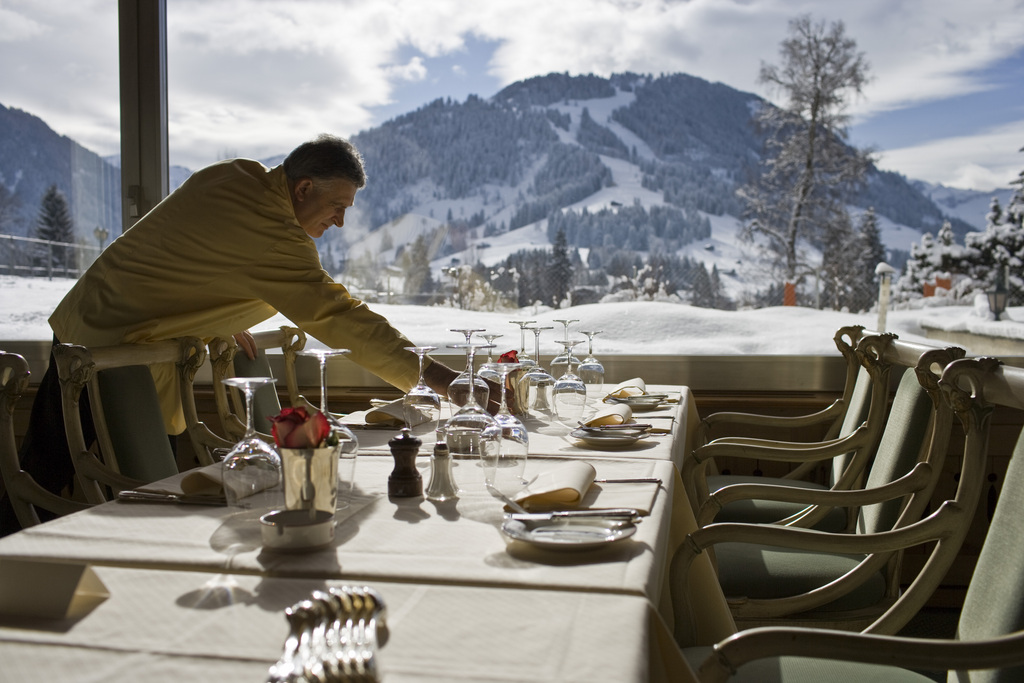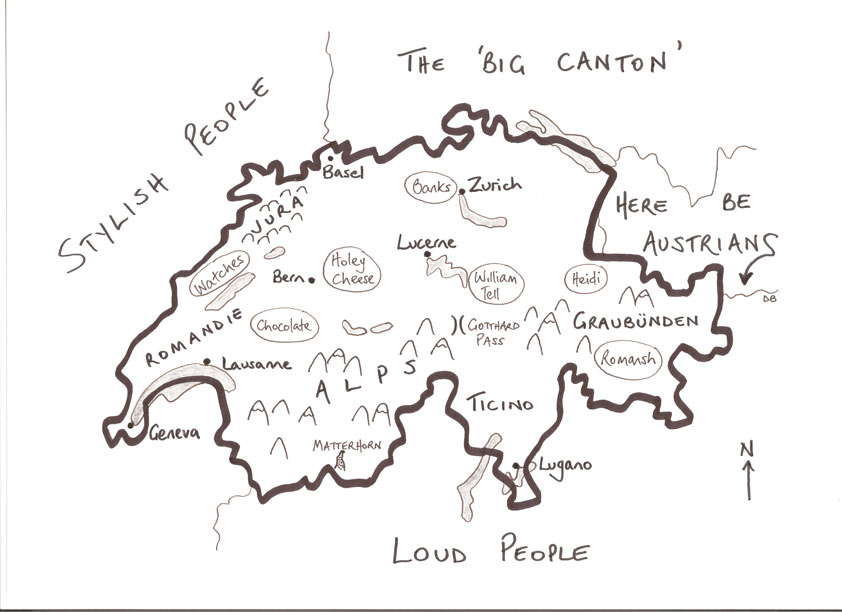Switzerland: in a class of its own

Everyone in Switzerland is middle class, according to the author of the country’s first guide to etiquette. Nevertheless, divisions exist: primarily between a flashier, outward-looking “global class” and the rest.
“There are very few class differences in Switzerland,” Christoph Stokar, who wrote Der Schweizer Knigge (the Swiss etiquette manual), tells swissinfo.ch.
“Some people talk about an ‘A Switzerland’ and a ‘B Switzerland’, the former being companies and people who think and act on a global scale. This includes many foreigners, who often work in the big multinationals, who see Switzerland as a base. These people are also very status-oriented – they buy cars, jewellery and display their wealth,” he says.
“Rich Swiss from old families don’t show off their money,” he adds. “There’s a saying about the Swiss: you might be a millionaire but you don’t show it. Sure, people buy diamonds here, but it’s not about their size, rather their clarity. It’s quality not quantity.”
Stokar’s book, which was published earlier this year and is available only in German, is an entertaining guide to not making a social idiot of yourself in a wide range of situations – for example, what to wear to a job interview, hosting or attending a dinner party, eating fiddly food (such as oysters) in a restaurant, tipping and even navigating social media.
Chapters always end with various dos and don’ts – “don’t force guests to wear house shoes” – and include several side boxes on business behaviour. The book also addresses potential social dilemmas such as whether a man should open a door for a woman and whether it’s vulgar to say “bless you” when someone sneezes (see box).
Should a man hold a door for a woman? According to Christoph Stokar, Switzerland is influenced by the German school rather than the French school, “so when a couple enters unknown territory – such as a restaurant – the man goes first to make sure everything’s safe. In the old days there used to be quite a lot of fighting in inns…”
In France, however, restaurants are considered friendly and the woman enters first. “Admittedly, in the business world such chivalrous behaviour is somewhat frowned upon – many women react to it in an almost hostile way: they don’t want preferential treatment.”
What about saying “Gesundheit!” or “Santé!” when someone sneezes? Is it considered as vulgar as some British people consider saying “bless you”?
“In Switzerland we do a lot out of friendliness, and we think it’s friendly to say ‘bless you’ or ‘enjoy your meal’. That said, raising a toast is particularly cumbersome. When 15 people are at a table and someone decides to clink glasses, then everyone has to stand up and do it with everyone else – it’s hellishly complicated. But it all stems from this feeling of harmony: you’re one of us, we’re all one nation and we all think the same.”
“With ‘bless you’, I tend to be of the opinion that bodily functions shouldn’t be commented on – you don’t say anything when someone farts, for example. But if little Fritz sneezes with all his heart on the tram, even I would probably say something.”
No blue blood
Stokar, 53, who graduated from the Lausanne Hotel School before becoming a copywriter, says he is “astonished” that his book is the first of its kind in Switzerland; bookshop shelves in Germany, Britain and the United States groan under etiquette guides.
“You could say that the Swiss are so well-behaved that they haven’t needed one!” he says, adding that there are various reasons for this gap in the market.
One is that many international companies, for example the big banks, or those in Switzerland’s large service industry often give their staff courses on social niceties, so learning how to behave is part of the training.
He also points to the lack of aristocracy in Switzerland. “Ultimately, politeness comes from the royal court, and in Switzerland we never had any royalty. If you were a good, decent person, you could get through life without a book like this,” he says.
“That’s not the case in England. If you’re invited to tea with the Queen, you have to know how to address her. But if you find yourself sitting next to a Swiss cabinet minister, you won’t be considered impolite or arrogant if you address [the current economics minister] as Mr Schneider-Ammann. The lack of an aristocratic past explains a lot.”
Social leveller
Elitism is an alien concept in a country which runs on consensus and harmony. “We don’t want to focus on differences; we want to focus on similarities,” Stokar says.
There are no Swiss equivalents of elite institutions such as British public schools, French grandes écoles or Ivy League universities in the United States. Although he admits this is changing.
“In the old days everyone sent their children to state schools – they wanted them to meet other people. But these globally minded people prefer to send them to bilingual schools to learn Chinese or Russian or whatever.”
The main social leveller in Switzerland, however, has always been – for men at least – compulsory military service.
“The army was where the classes really integrated. There isn’t an officer school where people become an officer not having been a soldier – everyone has to work their way up. Sons of bankers mingle with sons of farmers [such as current Swiss president Ueli Maurer],” he says.
“I myself met people who I previously wouldn’t have known very well. It was a good experience. But that’s also changing: now it’s easier to opt out. Previously it was really tricky to get out of.”
Adolph Freiherr Knigge (1752-1796) was a German aristocrat and writer.
He is best known for his 1788 work Über den Umgang mit Menschen (On Human Relations).
The work is influenced by Enlightenment thinking and is in fact more of a sociological and philosophical treatise on the basis of human relations than a how-to guide on politeness and table etiquette. It focuses on appropriate behaviour between different classes.
Nevertheless, in German, a “Knigge” (with a voiced “k”) has come to be the dictionary word for a guide to good manners and etiquette.
Linguistic divides
“It is impossible for an Englishman to open his mouth without making some other Englishman hate or despise him,” wrote Irish playwright George Bernard Shaw 100 years ago. This does not appear to be the case in Switzerland.
“We might make fun of people in canton Valais because we can’t understand them – and we immediately notice someone from St Gallen because their accent, for us in Zurich, might not be very sexy,” Stokar says.
But he denies that he could meet someone at a party and within a few minutes be able to tell whether they came from an old rich Swiss family. “Not from how they talked.”
Similarly, there are no words in Switzerland that give away one’s social background – unlike in Britain where the upper classes traditionally refer to napkins, sofas and loos, for example, while the lower and middle classes talk about serviettes, settees and toilets.
“In Basel and Bern there are old families who might use an old form of address – a bit like ‘Would one like a coffee?’ – but a real upper class as such doesn’t exist.”
The bling class
So does a class-free society mean the death of snobbery? Stokar, who was born in Zurich, which has a reputation among other Swiss for being a snob farm, laughs.
“There isn’t snobbery as you might know it in Britain. But signals can be given with products,” he says.
“If you buy an expensive car, in Germany it’s clearly written that it’s an eight-cylinder or 12-cylinder or whatever so that everyone knows how powerful your car is. But I bet this description is removed more in Switzerland than in any other country,” he says.
“The system here is very egalitarian. In fact you can divide Switzerland only into the fur-wearing super-rich who really display their wealth ostentatiously and the ‘normal’ people. The only distinguishing feature is money. But this is a new class – old money is very discreet. Even the rich ones are middle class actually.”
So everyone’s middle class, but some are more middle class than others.

In compliance with the JTI standards
More: SWI swissinfo.ch certified by the Journalism Trust Initiative


You can find an overview of ongoing debates with our journalists here. Please join us!
If you want to start a conversation about a topic raised in this article or want to report factual errors, email us at english@swissinfo.ch.